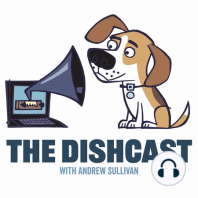20 min listen

Mickey Kaus On Immigration And Welfare
Mickey Kaus On Immigration And Welfare
ratings:
Length:
20 minutes
Released:
Mar 19, 2021
Format:
Podcast episode
Description
Mickey is an old friend and colleague from way back. His 1992 book, The End of Equality, was hugely influential for welfare reform in the Clinton years. You can listen to the episode right away in the audio player embedded above, or right below it you can click “Listen in podcast app” — which will connect you to the Dishcast feed. To hear three excerpts from my conversation with Mickey — on the history of how neoliberalism gutted the middle class; on whether Joe Biden’s amnesty policy amounts to “open borders”; and our questioning of what Biden actually believes, if anything — head over to our YouTube page.Mickey in the first ten minutes of the episode touches on a much-forgotten history noted by this reader:You wrote in your column last week that Johnson was a radically progressive president. Actually, I think that Nixon was more radically progressive. He might have been the most left-wing president of my lifetime since 1953. Nixon created the EPA and supported environmental legislation. He tried wage and price controls to combat inflation. Nixon’s 1969 Family Assistance Program included a guaranteed income (what we increasingly call UBI), and it passed the House but not the Senate. Nixon and Senator Ted Kennedy were also in negotiations for a federal universal health coverage plan. These negotiations didn’t get too far because of Watergate distractions and other priorities.Peter Beinart sizes up the LBJ-Biden analogy when it comes to foreign policy.Looking back to last week’s episode with addiction expert Sally Satel, a reader writes:Thank you for your incredibly fair treatment of AA, and 12-step programs generally. I’m 21 months sober and active in AA, and honestly my main issue has always been depression (which I largely see as my feelings of hopelessness and meaninglessness in this life). I believe the two are intimately connected for me. And I hear how people speak of the program in popular culture and even people who are in addiction services and they don’t seem to understand it, and I think it serves to actively dissuade people from going, which is a huge disservice to lots of people. I think you really understand it (have you spent some time in 12-step recovery?), and I just want to say thanks for doing it justice, in my mind. I also really appreciated this conversation with Sally generally, and the nuanced treatment of depression and addiction and how they are really social disorders, with biological and psychological and other bases.Never done 12-step myself. But I’ve seen its power in others. Another reader dissents a little:Sally Satel is so close! It’s true that addiction isn’t a disease, it’s a symptom — a symptom of a larger psychological problem, usually trauma of some kind. Something that requires escaping. Dr. Gabor Maté found from working with addicts that every single one of them had some kind of traumatic experience that they seek to escape through chemical means. Check him out:This next reader recommends Gabor Maté for the Dishcast and offers some excellent observations about the opioid crisis — both from a professional perspective and a personal one:Fantastic podcast this week with Sally Satel on a topic that interests me greatly (I edited a book about the opioid crisis). You asked some probing questions that the recovery community hasn’t been able to collectively answer: To what degree should we think of addiction as a brain disease, versus something that a person can control? And where should we assign responsibility for the scourge of addiction that is sweeping our country? Surely, the pharmaceutical companies behave villainously. And as you suggest, there are obvious reasons why addiction epidemics strike hardest where people were already suffering.But there is another issue that your podcast failed to take up, and I fear it is likewise lost in the broader conversation, at least among certain educated, liberal circles. I cannot believe that what I’m about to say should strike anyone as remotely con
Released:
Mar 19, 2021
Format:
Podcast episode
Titles in the series (100)
Olivia Nuzzi On Covering Trump by The Dishcast with Andrew Sullivan